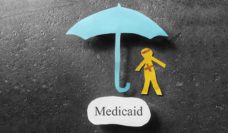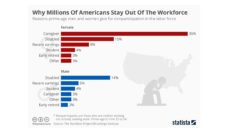Despite a relatively strong economy–unemployment down, real wages up–not all Americans are benefiting. In a recent report, the Urban Institute analyzed the ability of 7,500 Americans to meet basic needs by measuring material hardships.
Material hardships are defined as a struggle or inability to pay for housing, utilities, food, or healthcare. In 2018, nearly four in 10 respondents experienced at least one material hardship. Nearly a quarter faced multiple hardships.
As shown in the graph above, families earning less than 200% of the federal poverty level ($41,560 for a family of three) were more than twice as likely as those earning more than 200% of the federal poverty level to report at least one material hardship. Adults in lower-income households were also far more likely to cite food insecurity, unpaid healthcare bills, or unmet medical needs over the last year.
These findings illustrate the danger of assuming that a healthy economy means a content workforce. For example, while unemployment rates are down, more Americans than ever are underemployed, meaning they involuntarily work a part-time or lower-skilled job. If we consider underemployment in the unemployment rate, the number jumps from 3.9% to 7.2%. And underemployment, much like unemployment, has been linked to poorer physical health and general well-being.
With the 2020 election season fully underway, candidates need to propose solutions that bridge the gap between macroeconomic trends and the experiences of everyday Americans–far too many of whom are struggling to meet their basic needs.
Databyte via Despite Labor Market Gains in 2018, There Were Only Modest Improvements in Families’ Ability to Meet Basic Needs . Urban Institute, 2019.














